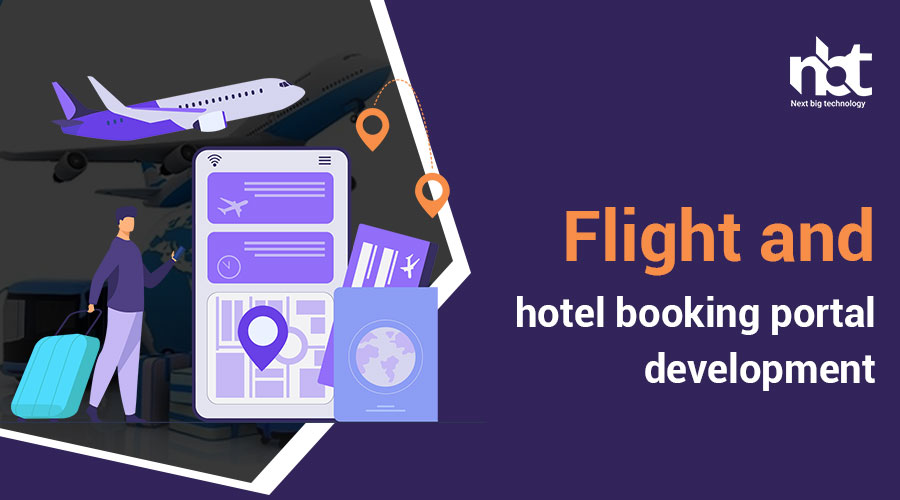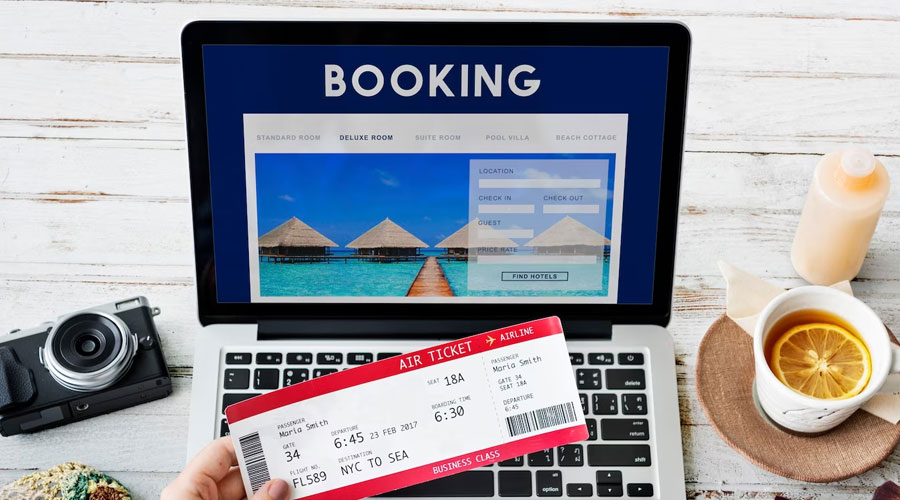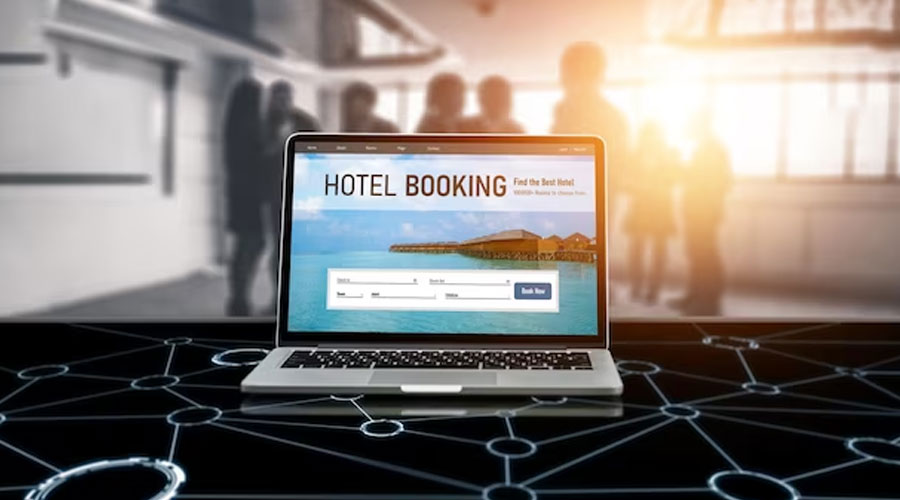Table of Contents
Flight and hotel booking portal development Services
In today’s fast-paced world, where travel has become an integral part of our lives, having a robust and efficient flight and hotel booking portal is essential for any travel business to thrive. With the advent of technology, more and more travelers are turning to online platforms to book their flights and accommodations conveniently. Therefore, investing in a tailored flight and hotel booking portal development service is not just advantageous but a necessity for travel agencies and companies looking to stay ahead in the competitive market.
Understanding the Need for Customized Solutions
Off-the-shelf solutions may seem tempting due to their quick deployment, but they often lack the flexibility and personalization required to meet the unique needs of your business. Customized portal development services, on the other hand, offer tailor-made solutions designed specifically to align with your business goals, target audience, and operational requirements.
Features That Set Apart a Comprehensive Booking Portal
- User-Friendly Interface: A user-friendly interface is paramount for ensuring a seamless booking experience. From easy navigation to intuitive design, every aspect of the portal should be optimized to enhance user satisfaction.
- Comprehensive Search Functionality: Implementing advanced search filters enables users to find the most relevant flight and hotel options based on their preferences, budget, and other criteria.
- Secure Payment Gateway Integration: Integrating a secure payment gateway instills trust among users and ensures hassle-free transactions, thereby enhancing the overall booking experience.
- Real-Time Updates and Notifications: Providing real-time updates on flight schedules, availability, and booking confirmations keeps users informed and engaged throughout the booking process.
- Multi-Lingual and Multi-Currency Support: Catering to a global audience requires multi-lingual and multi-currency support to enhance accessibility and accommodate diverse user preferences.
- Responsive Design: With the increasing trend of mobile bookings, having a responsive design that adapts seamlessly across various devices is indispensable for reaching a wider audience.
- Integration with Third-Party APIs: Integration with third-party APIs for airlines, hotels, and other travel services expands the range of options available to users and enhances the competitiveness of your portal.
The Benefits of Custom Portal Development Services
- Enhanced Brand Identity: A custom-built portal reflects your brand identity and values, thereby strengthening your brand presence in the market.
- Scalability and Flexibility: Custom solutions are scalable and can be easily adapted to accommodate future growth and evolving business requirements.
- Improved Customer Engagement: Personalized features and functionalities foster greater engagement and loyalty among users, leading to repeat bookings and referrals.
- Better Analytics and Insights: Custom portals allow for the integration of advanced analytics tools, providing valuable insights into user behavior and preferences, which can be leveraged to optimize marketing strategies and improve business performance.
How to Create a Flight and hotel booking portal development
In today’s digital age, the convenience of booking flights and hotels online has become a necessity for travelers worldwide. If you’re looking to tap into this lucrative market by creating your own flight and hotel booking portal, you’re in the right place. In this comprehensive guide, we’ll walk you through the essential steps to develop your portal successfully.
- Market Research: Before diving into development, it’s crucial to conduct thorough market research. Identify your target audience, analyze competitors, and understand the latest trends in the travel industry. This insight will help you tailor your portal to meet the specific needs of your users.
- Choose the Right Technology Stack: Selecting the appropriate technology stack is vital for the performance and scalability of your portal. Consider using popular programming languages like JavaScript (Node.js), frameworks such as React or Angular for the frontend, and robust backend technologies like Python (Django) or Java (Spring Boot).
- Data Aggregation: Partner with reliable APIs or integrate with Global Distribution Systems (GDS) to aggregate flight and hotel data. GDS providers like Amadeus, Sabre, and Travelport offer comprehensive databases and real-time access to inventory, prices, and availability from various airlines and hotel chains.
- User Experience (UX) Design: Focus on creating an intuitive and visually appealing user interface (UI) that enhances the booking experience. Implement features such as advanced search filters, interactive maps, and secure payment gateways to streamline the booking process and increase user satisfaction.
- Booking Engine Development: Develop a robust booking engine capable of handling complex searches, processing transactions securely, and generating booking confirmations in real-time. Ensure seamless integration with payment gateways and implement efficient error handling mechanisms to minimize booking failures.
- Mobile Responsiveness: With the increasing use of smartphones, optimizing your portal for mobile devices is non-negotiable. Adopt a responsive design approach to ensure seamless user experiences across various screen sizes and devices, thereby maximizing accessibility and engagement.
- Security Measures: Implement stringent security measures to safeguard user data, including Secure Sockets Layer (SSL) encryption, PCI DSS compliance for payment processing, and regular security audits to detect and mitigate potential vulnerabilities.
- Quality Assurance (QA) Testing: Prioritize thorough QA testing to identify and rectify any bugs, glitches, or usability issues before launching your portal. Conduct extensive testing across different browsers, devices, and scenarios to ensure a seamless and error-free user experience.
- Launch and Marketing Strategy: Once your portal is ready, launch it with a well-defined marketing strategy to attract users and drive traffic. Utilize digital marketing channels such as social media, search engine optimization (SEO), email marketing, and partnerships with travel influencers or bloggers to promote your portal effectively.
- Continuous Improvement: The journey doesn’t end with the launch. Continuously gather user feedback, monitor key performance indicators (KPIs), and iterate on your portal to enhance functionality, improve user experience, and stay ahead of the competition.
Why Should You Go for Flight and hotel booking portal development
In today’s fast-paced world, where travel has become an integral part of both personal and professional lives, the demand for efficient and user-friendly flight and hotel booking portals is on the rise. With the advent of technology, more and more travelers are turning to online platforms to plan and book their trips conveniently. If you’re contemplating whether to invest in flight and hotel booking portal development, here are five compelling reasons why you should take the leap:
- Enhanced Customer Experience: Investing in a well-designed flight and hotel booking portal can significantly enhance the overall customer experience. By offering intuitive interfaces, easy navigation, and seamless booking processes, you can ensure that users have a hassle-free experience from start to finish. Features such as real-time availability, price comparison, and personalized recommendations can further elevate the user experience, fostering customer loyalty and satisfaction.
- Increased Revenue Opportunities: A robust booking portal opens up various revenue streams for your business. In addition to earning commissions from flight and hotel bookings, you can explore additional monetization avenues such as advertising, affiliate partnerships, and premium membership programs. By diversifying your revenue sources, you can maximize your earnings and build a sustainable business model in the competitive travel industry.
- Global Reach and Accessibility: With an online booking portal, you can reach a global audience of travelers, irrespective of their geographical location. By offering multilingual support and catering to different currencies and payment methods, you can attract customers from diverse backgrounds and cater to their specific needs. Moreover, mobile optimization ensures that your portal is accessible to users on-the-go, allowing them to book flights and hotels anytime, anywhere.
- Data-driven Insights and Analytics: Investing in a booking portal equipped with robust analytics capabilities allows you to gain valuable insights into customer behavior, booking patterns, and market trends. By analyzing this data, you can make informed decisions regarding pricing strategies, inventory management, and marketing campaigns. Additionally, personalized recommendations based on user preferences can help drive conversions and boost customer satisfaction.
- Competitive Advantage: In today’s fiercely competitive travel industry, having a feature-rich booking portal can give you a significant edge over your rivals. By offering unique features, exclusive deals, and superior customer service, you can differentiate your brand and attract discerning travelers looking for value and convenience. Investing in continuous innovation and staying ahead of market trends ensures that you maintain your competitive advantage and stay relevant in the long run.
Market Prospects of Flight and hotel booking portal development
In today’s fast-paced world, where travel has become an integral part of both personal and professional lives, the demand for convenient and efficient booking platforms is at an all-time high. Flight and hotel booking portals have revolutionized the way people plan their trips, offering convenience, choice, and flexibility at their fingertips. As the travel industry continues to evolve, the market prospects for flight and hotel booking portal development are exceptionally promising.
The Rise of Online Travel Booking:
With the advent of the internet, the travel industry underwent a significant transformation. Gone are the days of traditional travel agencies and phone bookings. Today, travelers prefer the convenience of booking their flights and accommodations online, where they can compare prices, read reviews, and make reservations with just a few clicks.
This shift towards online booking has fueled the growth of flight and hotel booking portals. These platforms act as intermediaries between travelers and airlines/hotels, offering a one-stop solution for all their travel needs. From searching for the best deals to managing bookings and accessing travel-related information, these portals provide a seamless experience for users.
Key Market Trends Driving Growth:
Several key trends are driving the growth of the flight and hotel booking portal development market:
- Mobile Optimization: With the increasing use of smartphones, travelers expect booking portals to be optimized for mobile devices. Developers are focusing on creating responsive designs and user-friendly interfaces to enhance the mobile booking experience.
- Personalization: Today’s travelers seek personalized recommendations and tailored experiences. Booking portals are leveraging data analytics and artificial intelligence to understand user preferences and provide personalized recommendations for flights, hotels, and activities.
- Integration of Ancillary Services: To enhance the value proposition, booking portals are integrating ancillary services such as car rentals, travel insurance, and airport transfers. This allows travelers to conveniently book all aspects of their trip in one place.
- Emphasis on User Experience: User experience plays a crucial role in the success of booking portals. Developers are investing in intuitive navigation, fast loading times, and secure payment gateways to ensure a seamless booking experience for users.
- Partnership and Collaboration: Collaboration between booking portals, airlines, and hotels is becoming increasingly common. Partnerships enable portals to access a wider range of inventory and offer exclusive deals to customers, driving customer loyalty and retention.
Market Opportunities and Challenges:
The market prospects for flight and hotel booking portal development are promising, driven by factors such as increasing internet penetration, rising disposable incomes, and growing preference for online booking. However, developers also face certain challenges:
- Competition: The market is highly competitive, with several established players vying for market share. New entrants need to differentiate themselves by offering unique features, competitive pricing, and superior customer service.
- Security Concerns: With the increasing incidence of cyberattacks and data breaches, ensuring the security of user data is paramount. Developers need to implement robust security measures to protect sensitive information and build trust among users.
- Regulatory Compliance: The travel industry is subject to stringent regulations and compliance requirements. Developers need to stay abreast of regulatory changes and ensure that their platforms adhere to industry standards and guidelines.
- Technological Advancements: Technology is constantly evolving, and developers need to keep pace with the latest trends and innovations. Incorporating emerging technologies such as blockchain, augmented reality, and voice recognition can provide a competitive edge and enhance the user experience.
Essential Features of a Flight and hotel booking portal development
In today’s fast-paced world, where travel is both a necessity and a luxury, the demand for efficient flight and hotel booking portals has skyrocketed. With technology constantly evolving, travelers expect seamless experiences that simplify the booking process and enhance their overall journey. For businesses venturing into the realm of travel portal development, understanding the essential features is crucial for success. Let’s delve into the key elements that make a flight and hotel booking portal stand out in the competitive market.
- User-Friendly Interface: A user-friendly interface is paramount for any booking portal. It should be intuitive, visually appealing, and easy to navigate. From the homepage to the checkout process, every step should be designed with the user’s convenience in mind.
- Comprehensive Search Functionality: The search feature should allow users to quickly find and compare flights and hotels based on their preferences. Implementing filters for price range, dates, locations, and amenities ensures that users can tailor their search to suit their needs.
- Real-Time Availability and Pricing: Integrating with APIs from airlines and hotel chains enables real-time updates on availability and pricing. Users should be able to see accurate information and make bookings without encountering discrepancies or outdated listings.
- Secure Payment Gateway: Security is paramount when handling online transactions. Implementing a secure payment gateway instills trust in users and protects their sensitive information. SSL encryption and compliance with PCI DSS standards are essential for safeguarding financial data.
- Multi-lingual and Multi-currency Support: Catering to a global audience requires support for multiple languages and currencies. Offering content in different languages and allowing transactions in various currencies enhances accessibility and improves the user experience for international travelers.
- Mobile Responsiveness: In an era dominated by smartphones, mobile responsiveness is non-negotiable. The booking portal should provide a seamless experience across devices, ensuring that users can browse, book, and manage their reservations conveniently from their smartphones or tablets.
- Personalized Recommendations: Leveraging data analytics and machine learning algorithms, personalized recommendations can enhance the user experience. By analyzing past behavior and preferences, the portal can suggest relevant flights and accommodations tailored to each user’s preferences.
- Integration with Third-party Services: Integrating with third-party services such as travel insurance, car rentals, and airport transfers adds value to the portal and enhances the overall travel experience. Seamless integration allows users to book additional services directly through the portal.
- Robust Backend System: Behind the scenes, a robust backend system is essential for managing bookings, processing payments, and generating reports. An efficient backend ensures smooth operations and facilitates scalability as the portal grows.
- Customer Support and Feedback Mechanism: Providing excellent customer support is crucial for building trust and loyalty. Implementing a responsive customer support system, coupled with a feedback mechanism, allows users to voice their concerns and provides valuable insights for continuous improvement.
Advanced Features of a Flight and hotel booking portal development
In the fast-paced world of travel, having a reliable and feature-rich flight and hotel booking portal is essential for both travelers and service providers. With advancements in technology, these portals have evolved significantly, offering a plethora of features to enhance user experience and streamline operations. Let’s delve into some of the advanced features that are revolutionizing the landscape of flight and hotel booking portal development.
- Personalized User Profiles: Modern booking portals utilize data analytics to create personalized user profiles. By analyzing past bookings, preferences, and behavior, the portal can offer tailored recommendations, exclusive deals, and customized experiences, thereby enhancing user satisfaction and loyalty.
- Integrated Search and Booking: Integration with multiple airlines, hotels, and other service providers allows users to search for and book flights and accommodations seamlessly within the portal. Advanced algorithms optimize search results based on factors like price, location, amenities, and user preferences, ensuring a smooth booking experience.
- Dynamic Pricing and Inventory Management: Dynamic pricing algorithms enable real-time adjustment of fares and room rates based on demand, availability, and market trends. This feature not only maximizes revenue for service providers but also helps users find the best deals and discounts.
- Multi-channel Booking: To cater to the diverse needs of travelers, advanced booking portals offer multi-channel booking options, including web, mobile app, and even voice-enabled platforms. This omnichannel approach ensures accessibility and convenience, allowing users to book anytime, anywhere, using their preferred device or communication channel.
- Seamless Payment Gateways: Secure and seamless payment processing is crucial for any booking portal. Integration with multiple payment gateways, along with support for various currencies and payment methods, ensures a frictionless booking experience while maintaining the highest standards of security and compliance.
- Real-time Updates and Notifications: Keeping users informed about their bookings, including flight status updates, check-in reminders, and hotel reservations, is vital for a positive user experience. Advanced portals leverage real-time communication channels like SMS, email, and push notifications to provide timely updates and notifications throughout the travel journey.
- Social Media Integration: Integrating social media features allows users to share their travel plans, experiences, and reviews seamlessly. Social media login options simplify the registration process, while social sharing functionalities enhance engagement and virality, ultimately contributing to the portal’s growth and visibility.
- Customer Support and Feedback Mechanisms: Round-the-clock customer support, coupled with robust feedback mechanisms, enables users to seek assistance and provide valuable insights. AI-powered chatbots, virtual assistants, and feedback forms facilitate instant support and continuous improvement, fostering trust and loyalty among users.
- Advanced Analytics and Reporting: Data-driven insights derived from user behavior, booking patterns, and market trends empower service providers to make informed decisions and optimize their offerings. Advanced analytics tools and customizable reporting dashboards provide valuable insights into performance metrics, revenue generation, and customer satisfaction levels.
- Localization and Globalization: Catering to a global audience requires support for multiple languages, currencies, and cultural preferences. Advanced portals incorporate localization features to provide a personalized experience for users worldwide, thereby expanding their reach and market penetration.
Flight and hotel booking portal development Timelines
In the dynamic world of online travel booking, the creation of a comprehensive flight and hotel booking portal demands careful planning and execution. From conceptualization to deployment, each phase requires meticulous attention to detail to ensure a seamless user experience. Let’s explore the typical timelines involved in the development of such portals.
- Planning Stage (1-2 Weeks): The journey begins with extensive planning where the project scope, objectives, and target audience are identified. Stakeholder meetings, market research, and competitor analysis are conducted to gather insights crucial for shaping the portal’s features and functionalities.
- Design Phase (3-4 Weeks): Once the planning is in place, the design phase commences. User experience (UX) and user interface (UI) designers collaborate to create wireframes and prototypes. These prototypes undergo iterative refinement based on feedback, ensuring intuitive navigation and aesthetic appeal.
- Development (8-12 Weeks): With the designs finalized, the development team takes over to bring the portal to life. Front-end developers work on the visible elements of the website or app, ensuring responsiveness across various devices. Simultaneously, back-end developers build the infrastructure, integrating payment gateways, APIs, and database systems.
- Testing and Quality Assurance (4-6 Weeks): Rigorous testing is essential to identify and rectify any bugs or glitches before launch. Quality assurance engineers perform functional, performance, and security testing to guarantee a robust and reliable platform. User acceptance testing (UAT) involving real users helps validate the portal’s usability and functionality.
- Deployment (1-2 Weeks): Once the portal passes all quality checks, it’s ready for deployment. The deployment process involves configuring servers, setting up domain names, and transferring the codebase to the production environment. A smooth deployment ensures minimal downtime and uninterrupted service for users.
- Post-Launch Optimization (Ongoing): The launch of the portal is not the end but the beginning of a continuous improvement cycle. Feedback from users is collected and analyzed to identify areas for enhancement. Regular updates and feature additions keep the portal relevant and competitive in the ever-evolving travel industry.
- Marketing and Promotion (Ongoing): Alongside development, marketing efforts play a crucial role in attracting users to the portal. SEO optimization, social media marketing, email campaigns, and partnerships with travel influencers or agencies help increase visibility and drive traffic to the platform.
- Maintenance and Support (Ongoing): To ensure the smooth functioning of the portal, ongoing maintenance and support are imperative. This involves monitoring performance metrics, addressing technical issues promptly, and providing customer support to resolve user queries and concerns.
How Much Does It Cost to Build a Flight and hotel booking portal development ?
In today’s digitally driven world, the travel industry has witnessed a significant shift towards online bookings. With the convenience of booking flights and hotels from the comfort of one’s own home, the demand for efficient and user-friendly booking portals has surged. If you’re considering venturing into the development of a flight and hotel booking portal, one of the primary concerns you’re likely to have is the cost involved. Let’s delve into the various factors that influence the cost of building such a portal.
- Scope and Complexity: The first factor to consider is the scope and complexity of your portal. Are you envisioning a simple platform that facilitates basic flight and hotel bookings, or do you want to incorporate advanced features such as multi-city bookings, loyalty programs, and personalized recommendations? The more complex your requirements, the higher the development costs are likely to be.
- Design and User Experience: An intuitive and visually appealing design is crucial for attracting and retaining users. Investing in professional UI/UX design can elevate the user experience and differentiate your portal from competitors. However, bespoke design comes at a cost, so budget accordingly based on your aesthetic preferences and target audience.
- Technology Stack: The choice of technology stack can significantly impact development costs. Are you opting for a custom-built solution or leveraging existing frameworks and platforms? Consider factors such as scalability, security, and compatibility with third-party integrations when selecting your technology stack.
- Integration of APIs: Flight and hotel booking portals rely heavily on integration with third-party APIs for accessing real-time data on prices, availability, and bookings. Depending on the number of APIs you need to integrate and their complexity, the development effort and costs can vary. Additionally, consider ongoing maintenance costs associated with API updates and maintenance.
- Payment Gateway Integration: Seamless and secure payment processing is essential for any booking portal. Integrating payment gateways involves upfront costs for development as well as ongoing transaction fees. Be sure to choose reliable payment gateways that support multiple currencies and payment methods to cater to a global audience.
- Regulatory Compliance and Security: Compliance with industry regulations such as GDPR and PCI DSS is non-negotiable when handling sensitive customer data and payment information. Implementing robust security measures and ensuring regulatory compliance will incur additional development costs but is essential for building trust and credibility with your users.
- Testing and Quality Assurance: Thorough testing and quality assurance are imperative to identify and rectify any bugs or usability issues before launching your portal. Allocate sufficient resources and budget for testing across various devices, browsers, and user scenarios to deliver a seamless user experience.
- Maintenance and Support: Launching your portal is just the beginning. Ongoing maintenance, updates, and technical support are essential for keeping your portal running smoothly and addressing any issues that may arise post-launch. Factor in the costs of hosting, monitoring, and regular updates to ensure the long-term success of your portal.
How to Create a Flight and hotel booking portal development – Team and Tech Stack
In today’s fast-paced world, the convenience of booking flights and hotels online has become indispensable. With the rising demand for seamless travel planning, developing a flight and hotel booking portal can be a lucrative venture. However, embarking on such a project requires careful planning, the right team, and a well-thought-out tech stack. In this guide, we’ll walk you through the essential steps of creating a successful flight and hotel booking portal, from assembling your team to selecting the perfect technology stack.
Assembling Your Team:
- Project Manager: Start by appointing a capable project manager who will oversee the entire development process. They should have experience in managing similar projects and possess strong communication skills to coordinate tasks effectively.
- Developers: Your development team should consist of skilled professionals proficient in front-end and back-end development, as well as database management. Look for individuals with expertise in technologies such as HTML, CSS, JavaScript, and popular frameworks like React or Angular for the front end, and languages like Python, Java, or Node.js for the back end.
- UI/UX Designers: A user-friendly interface is critical for a booking portal’s success. Hire talented UI/UX designers who can create intuitive layouts, smooth navigation, and visually appealing designs to enhance the user experience.
- Quality Assurance (QA) Team: To ensure the portal functions flawlessly and delivers a seamless experience to users, establish a dedicated QA team. Their role will involve rigorous testing, identifying bugs, and ensuring compatibility across different devices and browsers.
- Business Analyst: Having a business analyst onboard can provide valuable insights into market trends, user behavior, and competitor analysis. They will help refine your portal’s features and functionalities to meet the evolving needs of your target audience.
Selecting the Right Tech Stack:
- Front-End Technologies: Choose front-end technologies that enable responsive design and smooth user interactions. Frameworks like React.js or Vue.js offer flexibility and performance, while CSS preprocessors like SASS or LESS streamline styling.
- Back-End Technologies: Opt for robust back-end technologies that can handle complex data processing and integration with external APIs. Consider using frameworks like Django (Python), Express.js (Node.js), or Spring Boot (Java) for building scalable and secure server-side applications.
- Database Management: Select a database management system (DBMS) that aligns with your scalability and performance requirements. Relational databases like PostgreSQL or MySQL are commonly used for storing structured data, while NoSQL databases like MongoDB offer flexibility for handling unstructured data.
- Payment Gateway Integration: Integrating a secure payment gateway is essential for processing transactions smoothly. Choose reputable payment gateways like PayPal, Stripe, or Braintree, and ensure compliance with industry standards for data security (e.g., PCI DSS).
- API Integration: To provide users with comprehensive booking options, integrate APIs from airlines, hotels, and other travel service providers. APIs like Amadeus, Sabre, or Expedia offer access to extensive travel inventory and real-time pricing information.
- Security Measures: Implement robust security measures to protect user data and prevent unauthorized access. Utilize encryption protocols (e.g., SSL/TLS) for secure data transmission, implement strong authentication mechanisms, and regularly audit your system for vulnerabilities.
Flight and hotel booking portal development Process
In today’s fast-paced world, the convenience of booking flights and hotels online has become indispensable. This surge in demand has led to the proliferation of flight and hotel booking portals, offering users a seamless experience in planning their travel itineraries. However, behind the user-friendly interface lies a complex development process that ensures smooth functionality and reliability. Let’s delve into the intricacies of developing a flight and hotel booking portal.
- Conceptualization and Planning: The journey begins with a thorough understanding of the client’s requirements and target audience. Developers brainstorm ideas, research market trends, and outline the portal’s features and functionalities. Factors such as user interface design, payment gateways, search algorithms, and integration with airline and hotel databases are meticulously planned during this phase.
- Design and User Experience (UX): Design plays a pivotal role in attracting and retaining users. Developers focus on creating an intuitive interface that enhances the user experience. Wireframes and prototypes are crafted to visualize the portal’s layout, ensuring seamless navigation and accessibility across devices. Attention is paid to factors like page load speed, responsive design, and interactive elements to captivate users from the moment they land on the portal.
- Backend Development: Behind every user action on the portal lies a robust backend infrastructure. Developers utilize programming languages like Python, Java, or PHP to build the logic that powers the portal’s functionality. Integration with third-party APIs for fetching real-time flight and hotel data is essential for providing accurate search results and availability information. Security measures such as data encryption, secure payment gateways, and user authentication protocols are implemented to safeguard sensitive information.
- Database Management: The heart of any booking portal lies in its database management system. Developers design and optimize databases to efficiently store and retrieve vast amounts of travel-related data, including flight schedules, seat availability, hotel listings, and user preferences. Technologies like SQL or NoSQL databases are leveraged based on the scalability and performance requirements of the portal.
- Testing and Quality Assurance: Before the portal goes live, rigorous testing is conducted to identify and rectify any bugs or issues. Functional testing ensures that all features work as intended, while compatibility testing ensures seamless performance across various browsers and devices. Load testing simulates heavy user traffic to assess the portal’s performance under peak conditions. Additionally, security audits are conducted to identify vulnerabilities and ensure compliance with data protection regulations.
- Deployment and Maintenance: Once testing is complete, the portal is deployed to a production environment, making it accessible to users worldwide. However, the journey doesn’t end here. Continuous monitoring and maintenance are essential to ensure the portal’s smooth operation. Regular updates, security patches, and performance optimizations are performed to keep the portal running efficiently and securely.
Next Big Technology – Your Trusted Flight and hotel booking portal development Partner
In today’s fast-paced world, technology continues to revolutionize the way we travel and book accommodations. With the rise of online booking portals, travelers now have the convenience of arranging flights and accommodations from the comfort of their own homes. As the demand for seamless booking experiences grows, the need for reliable technology partners becomes increasingly vital. This is where Next Big Technology steps in – as your trusted partner for flight and hotel booking portal development.
At Next Big Technology, we understand the evolving needs of the travel industry. With years of experience and expertise in software development, we specialize in crafting tailored solutions for flight and hotel booking portals. Whether you’re a startup looking to enter the travel market or an established company aiming to enhance your online presence, we have the capabilities to bring your vision to life.
Our team of skilled developers, designers, and project managers works closely with clients to understand their specific requirements and goals. We believe in collaborative partnerships, where communication and transparency are key. From initial concept planning to final implementation, we ensure that every step of the development process is carried out with precision and attention to detail.
One of the key aspects of our service is customization. We recognize that every client is unique, and so are their needs. That’s why we offer fully customizable solutions that are tailored to fit your business model and branding. Whether you require a simple booking platform or a comprehensive travel management system, we have the flexibility to adapt to your requirements.
In addition to customization, we prioritize user experience and functionality. Our team is well-versed in the latest technologies and industry trends, allowing us to create intuitive and feature-rich booking portals that provide users with a seamless and enjoyable experience. From search and booking functionalities to payment processing and itinerary management, we ensure that every aspect of the portal is optimized for performance and usability.
Furthermore, we understand the importance of scalability and future-proofing. As your business grows and evolves, so too should your booking portal. Our solutions are built with scalability in mind, allowing for easy expansion and integration of new features as your business needs change. Whether you’re catering to a niche market or targeting a global audience, our scalable solutions can accommodate your growth trajectory.
At Next Big Technology, we are committed to delivering high-quality, reliable, and innovative solutions that exceed our clients’ expectations. With our expertise in flight and hotel booking portal development, you can trust us to be your reliable partner every step of the way. Let us help you unlock the full potential of your travel business and take it to new heights. Get in touch with us today to learn more about how we can support your goals and initiatives.
Enterprise Flight and hotel booking portal development
In today’s fast-paced world, where businesses operate on a global scale, efficient travel arrangements are paramount. Whether it’s for corporate meetings, client visits, or employee trips, having a streamlined system for booking flights and hotels can significantly enhance productivity and cost-effectiveness. This is where enterprise flight and hotel booking portal development comes into play, offering a comprehensive solution tailored to the needs of large organizations.
Understanding Enterprise Flight and Hotel Booking Portals
Enterprise flight and hotel booking portals are sophisticated platforms designed to facilitate seamless travel management for corporations. These portals integrate advanced features such as real-time flight and hotel availability, personalized booking options, travel policy enforcement, expense tracking, and reporting functionalities. By centralizing travel-related tasks, these portals simplify the entire booking process while ensuring compliance with company policies and cost-control measures.
Key Benefits of Enterprise Booking Portals
- Streamlined Booking Process: With an enterprise booking portal, employees can easily search, compare, and book flights and accommodations from a single interface. This streamlines the booking process, saving valuable time and reducing administrative overhead.
- Cost Optimization: By providing access to negotiated corporate rates and enforcing travel policies, enterprise portals help organizations optimize travel expenses. Additionally, built-in reporting tools enable managers to identify cost-saving opportunities and track travel expenditures more effectively.
- Policy Compliance: Enterprises often have specific travel policies regarding preferred airlines, hotel chains, and booking procedures. A dedicated booking portal ensures that employees adhere to these policies, minimizing the risk of non-compliance and unauthorized expenses.
- Enhanced Visibility and Control: With centralized data management and reporting capabilities, enterprise portals offer stakeholders greater visibility into travel activities. This enhanced transparency enables management to make informed decisions, monitor travel trends, and identify areas for improvement.
- Improved Duty of Care: In today’s uncertain world, ensuring the safety and well-being of employees during travel is paramount. Enterprise booking portals provide features such as traveler tracking, emergency assistance, and risk management alerts, thereby enhancing duty of care and mitigating travel-related risks.
Customization and Scalability
One of the key advantages of enterprise booking portals is their ability to adapt to the unique requirements of each organization. Whether it’s integrating with existing ERP systems, customizing workflows, or incorporating specific branding elements, these portals offer a high degree of customization. Furthermore, they are designed to scale alongside the growth of the organization, accommodating increased travel volume and evolving business needs.
Top Flight and hotel booking portal development Companies
In the rapidly evolving landscape of travel technology, the demand for seamless, user-friendly flight and hotel booking portals has never been higher. With travelers increasingly relying on online platforms to plan their journeys, the importance of innovative and reliable booking portals cannot be overstated. In this article, we’ll explore some of the top flight and hotel booking portal development companies that are leading the way in revolutionizing the travel industry.
-
Next Big Technology:
Next Big Technology is one of the top development companies for the high-quality development of mobile apps and web development services. They have having experienced in-house team of developers who provide top-notch development services according to the business requirements. NBT provides highly business-oriented services and implements all the latest and trending tools and technologies. They always work hard to deliver a top-notch solution at an affordable cost. They are having experience of more than 13 years and delivered lots of projects around the globe to businesses and clients.
NBT is highly focused on providing top-notch development solutions at a very affordable cost. By using their market experience and development experience, they are delivering proper solutions to clients and various industries for their custom requirements.
Location: India, USA, UK, Australia
Hourly Rate :< $25 per Hour
Employees: 50 – 249
Focus Area
- Mobile App Development
- App Designing (UI/UX)
- Software Development
- Web Development
- AR & VR Development
- Big Data & BI
- Cloud Computing Services
- DevOps
- E-commerce Development
Industries Focus
- Art, Entertainment & Music
- Business Services
- Consumer Products
- Designing
- Education
- Financial & Payments
- Gaming
- Government
- Healthcare & Medical
- Hospitality
- Information Technology
- Legal & Compliance
- Manufacturing
- Media
- Sabre Corporation: Sabre Corporation is renowned for its advanced technology solutions tailored specifically for the travel industry. Their flight and hotel booking portal development services leverage data analytics and artificial intelligence to deliver personalized recommendations and seamless booking experiences for travelers.
- Amadeus IT Group: Amadeus IT Group is a trusted partner for airlines, hotels, and travel agencies worldwide, offering innovative solutions for booking and reservation management. Their expertise in developing scalable and reliable booking portals ensures that travelers have access to a vast inventory of flights and accommodations at competitive prices.
- Booking.com: Known for its extensive inventory of hotels, apartments, and other accommodations, Booking.com also offers robust booking portal development services for businesses looking to enhance their online presence. Their customizable solutions empower travel companies to create tailored booking experiences for their customers.
- Travelport: Travelport specializes in providing technology solutions for the travel industry, including advanced booking portal development services. Their comprehensive platform integrates seamlessly with existing systems, enabling travel businesses to streamline their operations and improve customer satisfaction.
- MakeMyTrip: As one of the leading online travel agencies in India, MakeMyTrip has earned a reputation for its user-friendly booking portal and comprehensive travel services. Their in-house team of developers is adept at creating customized booking solutions that cater to the unique needs of the Indian travel market.
- Ctrip: Ctrip, now known as Trip.com Group, is a dominant force in the Asian travel market, offering a wide range of services including flight and hotel booking portals. Their innovative technology solutions leverage big data and machine learning to deliver personalized recommendations and enhance the overall travel experience.
- Orbitz: Orbitz, a subsidiary of Expedia Group, specializes in providing comprehensive travel solutions for leisure and business travelers alike. Their intuitive booking portal development services prioritize usability and efficiency, ensuring that customers can easily find and book the perfect flights and accommodations for their needs.
- Priceline: Priceline is renowned for its unique “Name Your Own Price” feature, which allows travelers to bid on hotel rooms and flights at discounted rates. Their booking portal development services focus on delivering a seamless and transparent booking experience, with a wide range of options to suit every budget and preference.
- Agoda: Agoda, part of the Booking Holdings Inc. family, specializes in offering accommodations across the globe, from luxury resorts to budget-friendly hostels. Their booking portal development services emphasize simplicity and convenience, making it easy for travelers to find and book their ideal accommodations with just a few clicks.
FAQs on Flight and hotel booking portal development
In the digital age, the travel industry has witnessed a significant transformation with the advent of flight and hotel booking portals. These platforms streamline the process of planning and booking trips, offering convenience and efficiency to travelers worldwide. However, with innovation comes curiosity, and there are several frequently asked questions (FAQs) surrounding the development of such portals. Let’s delve into some of these queries to gain a better understanding.
- What is a Flight and Hotel Booking Portal? A flight and hotel booking portal is an online platform that allows users to search, compare, and book flights, hotels, rental cars, and other travel-related services. These portals aggregate data from various airlines, hotels, and travel agencies, providing users with a comprehensive range of options to choose from.
- How does a Flight and Hotel Booking Portal Work? These portals utilize sophisticated algorithms to gather real-time data from multiple sources. Users enter their travel preferences, such as destination, dates, and budget, and the portal generates a list of available options. Users can then compare prices, schedules, and amenities before making a reservation directly through the portal.
- What are the Key Features of a Flight and Hotel Booking Portal? Key features of these portals include advanced search functionality, secure payment gateways, user profiles for personalized recommendations, real-time availability updates, and multi-language support. Additionally, integration with third-party APIs for flight and hotel data is essential for providing up-to-date information.
- How is the User Experience (UX) Optimized in such Portals? UX optimization is crucial for ensuring a seamless booking experience. This includes intuitive navigation, responsive design for mobile devices, fast loading times, and clear presentation of information. Personalization features, such as saved preferences and booking history, further enhance the user experience.
- What Technologies are Used in Developing Flight and Hotel Booking Portals? Development of these portals often involves a combination of front-end and back-end technologies. Front-end technologies may include HTML, CSS, and JavaScript frameworks like React or Angular, while back-end development may utilize languages such as Python, PHP, or Java, along with databases like MySQL or MongoDB. APIs from airlines, hotels, and payment gateways are integrated for data exchange.
- How is Security Ensured in Flight and Hotel Booking Portals? Security is a top priority in travel portals, given the sensitive nature of personal and financial information involved. Implementing SSL encryption, adhering to PCI DSS compliance standards for payment processing, and regularly updating security protocols are essential measures. Additionally, robust authentication mechanisms and data encryption techniques safeguard user data from unauthorized access.
- What are the Challenges Faced in Developing such Portals? Developing flight and hotel booking portals comes with various challenges, including integrating disparate data sources, managing complex booking workflows, ensuring compatibility with multiple devices and browsers, and addressing security vulnerabilities. Additionally, maintaining uptime and reliability to handle high traffic volumes during peak booking periods is a significant challenge.
- How can I Monetize a Flight and Hotel Booking Portal? Monetization strategies for these portals include earning commissions on bookings, offering premium subscription services for enhanced features or discounts, displaying targeted advertisements, and partnering with travel-related businesses for referral programs. Providing value-added services such as travel insurance or concierge services can also generate revenue.
Thanks for reading our post “Flight and hotel booking portal development”. Please connect with us to learn more about the Flight and hotel booking portal.
























